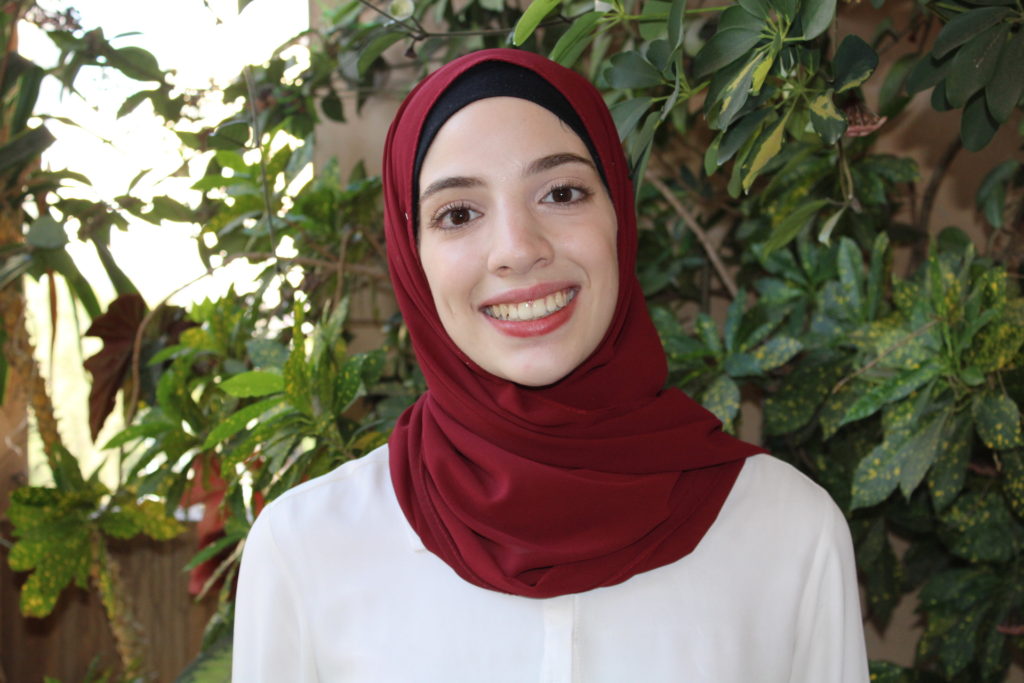Acile Nahlawi, 25, is a final year medical student at the American University of Beirut (AUB). In January 2020, she founded Gold Clinic, an AUB student-run humanitarian initiative that aims to provide free medical and social care to older people in need.
“Older people mean a lot to me. My grandmother passed away two years ago after a long struggle with illness. She was a strong and independent person, who fought to promote women’s rights. She used to lead an NGO called “Providing Charity”, that provided women with employment opportunities. My grandmother’s health opened my eyes about the living conditions of the elderly and made me want to learn more. After her death, I started visiting older people during my free time with my friends, and organizing events and fundraisers.
I realized how bad their living conditions were : how society forgets about them, limits them to being second-class citizens, how stereotypes and discriminiations weigh on them: they are seen as useless and inactive, only good at watching television. I mean, look at people’s reactions in the beginning of the coronavirus pandemic. Some of them thought-and still think- that we’re overreacting because Covid19 mostly kills the elderly.
In addition to feeling invisible, older people suffer from a severe lack of access to healthcare. A big part of them can’t afford health insurance. They have to pay from their own pocket even if they don’t have any source of income. This situation has worsened with the crisis.

For this reason, I founded Gold Clinic in January 2020. The name comes from the contraction of “Growing Old”, it’s also a pun with the fact that I consider old age as the human being’s golden age, whether in terms of wisdom or experience.
Gold Clinic, a free clinic led by student volunteers in the heart of the American University of Beirut, is open every Friday. The only two requirements to access our services are being older than 60 and being in a tight financial situation. We offer a number of services such as cardiology, laboratory tests, ophthalmology, surgery, medical imaging, as well as an access to medicine and to psychological support. We aim to develop the social aspect of our clinic through a number of intergenerational activities (brunches, games, etc.) involving older people and kids. These initiatives are still very rare in Lebanon.
The Gold Clinic has two objectives: providing care to older people in need and breaking the stigma that weighs on them by highlighting their importance to society. We are working also to integrate domestic violence on older people in the academic curriculum of AUB, since as students, we aren’t trained on how to detect and react to this kind of violence.
For the 200 student volunteers that work with us, supervised by AUB professors, the Gold Clinic is an excellent way to assert themselves as future physicians. We have also compiled the data of our patients in order to build a database that allows the medical body to get a better idea on how to treat older people.
The patients are sent to us by local NGOs (Ajialouna, Beit-El-Baraka and AUB Neighborhood Initiative) with whom we collaborate, and who make sure that our patients are truly in need.
Concerning the funding of the clinic, we depend exclusively on donations and fundraisers, through the sale of masks for example. We are med students, so we don’t really have any management or business skills. This is where the Omdi program, to which we are laureates, comes in. Omdi is a project launched by the French embassy and the French Institute in Lebanon in collaboration with the makesense incubator aiming to support initiatives by young people who are trying to solve local challenges in Lebanon. We had many questions, competences to develop, financial challenges to overcome, so Omdi helps filling this gap by providing us with training sessions and financial aid.
Having a lot of patients isn’t our goal. What interests us is being capable of securing a long-term personalised follow-up for each of our patients. Right now, we are taking care of 70 regular patients. We want to reach 100 per year.
Founding of the clinic hasn’t been easy. I am a student, and I had to convince my classmates, professors, and some NGOs to help us. They told me that it wasn’t the right time, that I better be studying. It’s true that sometimes I focus more on the clinic, but I am holding on to my dream and have no regrets. I need to be part of the change now, and highlight the importance of taking care of older people. Today, we are proud of being the most active student-run initiative in the university. Helping people in need, with our humble means is a badge of honor.”
Omdi is a program financed by the French Institute of Lebanon and the French Embassy, in partnership with makesense incubator. It supports 15 projects made by young people in Lebanon that aim to solve a social and environmental local problem.
#GSC This post is sponsored by by omdi
